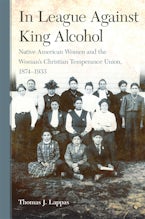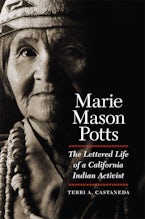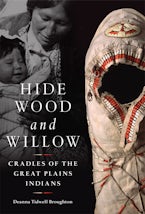HISTORY / Women
Showing results 1-10 of 16
Filter Results OPEN +

Who Is a Worthy Mother?
An Intimate History of Adoption
As the United States once again finds itself embroiled in heated disputes over women’s bodily autonomy—disputes in which adoption plays a central role—Wellington’s book offers a unique and much-needed frame of reference.
Fritzie
The Invented Life and Violent Murder of a Flapper
In Fritzie, historian Amy Absher reveals how broader cultural forces, including gendered violence, sexual liberation, and evolving urban conditions in the American West, shaped the course of Mann’s life and contributed to her tragic death.
Cacicas
The Indigenous Women Leaders of Spanish America, 1492–1825
This volume showcases colonial cacicas as historical subjects who constructed their consciousness around their place, whether symbolic or geographic, and articulated their own unique identities. It expands our understanding of the significant influence these women exerted—within but also well beyond the native communities of Spanish America.
The Girl Who Dared to Defy
Jane Street and the Rebel Maids of Denver
Setting Jane’s story within the wider context of early-twentieth-century class struggles and the women’s suffrage movement, The Girl Who Dared to Defy paints a fascinating—and ultimately heartbreaking—portrait of one woman’s courageous fight for equality.
In League Against King Alcohol
Native American Women and the Woman's Christian Temperance Union, 1874–1933
Lappas’s work places Native women at the center of the temperance story, showing how they used a women’s national reform organization to move their own goals and objectives forward. Subtly but significantly they altered the welfare and status of American Indian communities in the early twentieth century.
Marie Mason Potts
The Lettered Life of a California Indian Activist
Potts’s voluminous correspondence documents her steadfast conviction that California Indians deserved just compensation for their stolen ancestral lands, a decent standard of living, the right to practice their traditions, and political agency in their own affairs. Drawing extensively from this trove of writings, Castaneda privileges Potts’s own voice in the telling of her story and offers a valuable history of California Indians in the twentieth century.
A Life on Fire
Oklahoma's Kate Barnard
In A Life on Fire, Connie Cronley tells the story of Catherine Ann “Kate” Barnard (1875–1930), a fiery political reformer and the first woman elected to state office in Oklahoma, as commissioner of charities and corrections in 1907—almost fifteen years before women won the right to vote in the United States.
This Land Is Herland
Gendered Activism in Oklahoma from the 1870s to the 2010s
Underscoring the diversity of women’s experiences, the editors and contributors provide fresh and engaging perspectives on the western roots of gendered activism in Oklahoma. This volume expands and enhances our understanding of the complexities of western women’s history.
America's Best Female Sharpshooter
The Rise and Fall of Lillian Frances Smith
Drawing on family records, press accounts, interviews, and numerous other sources, historian Julia Bricklin peels away the myths that enshroud Smith’s fifty-year career. Known as “The California Huntress” before she was ten years old, Smith was a professional sharpshooter by the time she reached her teens, shooting targets from the back of a galloping horse in Buffalo Bill Cody’s Wild West.
Hide, Wood, and Willow
Cradles of the Great Plains Indians
Despite decades of political and social upheaval among Plains tribes, the significance of the cradle endures. Today, a baby can still be found wrapped up and wide-eyed, supported by a baby board. With its blend of stunning full-color images and detailed information, this book is a fitting tribute to an important and ongoing tradition among indigenous cultures.

Who Is a Worthy Mother?
An Intimate History of Adoption
As the United States once again finds itself embroiled in heated disputes over women’s bodily autonomy—disputes in which adoption plays a central role—Wellington’s book offers a unique and much-needed frame of reference.
Fritzie
The Invented Life and Violent Murder of a Flapper
In Fritzie, historian Amy Absher reveals how broader cultural forces, including gendered violence, sexual liberation, and evolving urban conditions in the American West, shaped the course of Mann’s life and contributed to her tragic death.
Cacicas
The Indigenous Women Leaders of Spanish America, 1492–1825
This volume showcases colonial cacicas as historical subjects who constructed their consciousness around their place, whether symbolic or geographic, and articulated their own unique identities. It expands our understanding of the significant influence these women exerted—within but also well beyond the native communities of Spanish America.
The Girl Who Dared to Defy
Jane Street and the Rebel Maids of Denver
Setting Jane’s story within the wider context of early-twentieth-century class struggles and the women’s suffrage movement, The Girl Who Dared to Defy paints a fascinating—and ultimately heartbreaking—portrait of one woman’s courageous fight for equality.
In League Against King Alcohol
Native American Women and the Woman's Christian Temperance Union, 1874–1933
Lappas’s work places Native women at the center of the temperance story, showing how they used a women’s national reform organization to move their own goals and objectives forward. Subtly but significantly they altered the welfare and status of American Indian communities in the early twentieth century.
Marie Mason Potts
The Lettered Life of a California Indian Activist
Potts’s voluminous correspondence documents her steadfast conviction that California Indians deserved just compensation for their stolen ancestral lands, a decent standard of living, the right to practice their traditions, and political agency in their own affairs. Drawing extensively from this trove of writings, Castaneda privileges Potts’s own voice in the telling of her story and offers a valuable history of California Indians in the twentieth century.
A Life on Fire
Oklahoma's Kate Barnard
In A Life on Fire, Connie Cronley tells the story of Catherine Ann “Kate” Barnard (1875–1930), a fiery political reformer and the first woman elected to state office in Oklahoma, as commissioner of charities and corrections in 1907—almost fifteen years before women won the right to vote in the United States.
This Land Is Herland
Gendered Activism in Oklahoma from the 1870s to the 2010s
Underscoring the diversity of women’s experiences, the editors and contributors provide fresh and engaging perspectives on the western roots of gendered activism in Oklahoma. This volume expands and enhances our understanding of the complexities of western women’s history.
America's Best Female Sharpshooter
The Rise and Fall of Lillian Frances Smith
Drawing on family records, press accounts, interviews, and numerous other sources, historian Julia Bricklin peels away the myths that enshroud Smith’s fifty-year career. Known as “The California Huntress” before she was ten years old, Smith was a professional sharpshooter by the time she reached her teens, shooting targets from the back of a galloping horse in Buffalo Bill Cody’s Wild West.
Hide, Wood, and Willow
Cradles of the Great Plains Indians
Despite decades of political and social upheaval among Plains tribes, the significance of the cradle endures. Today, a baby can still be found wrapped up and wide-eyed, supported by a baby board. With its blend of stunning full-color images and detailed information, this book is a fitting tribute to an important and ongoing tradition among indigenous cultures.











